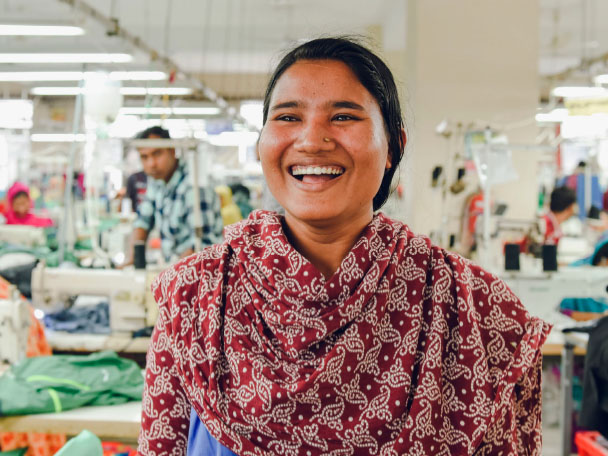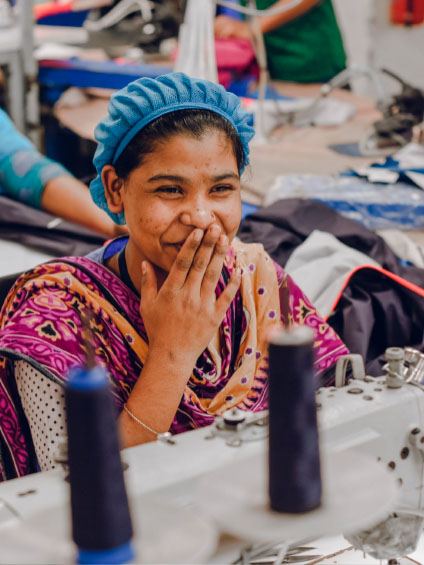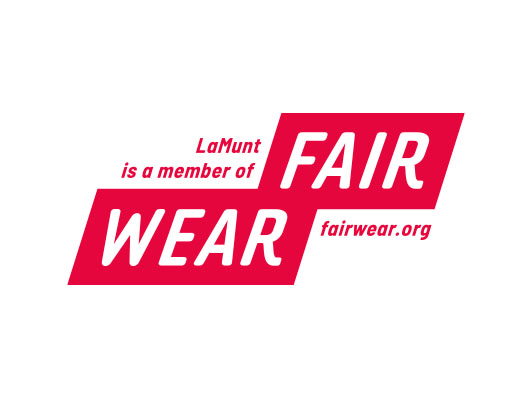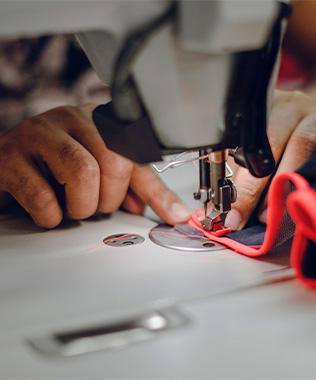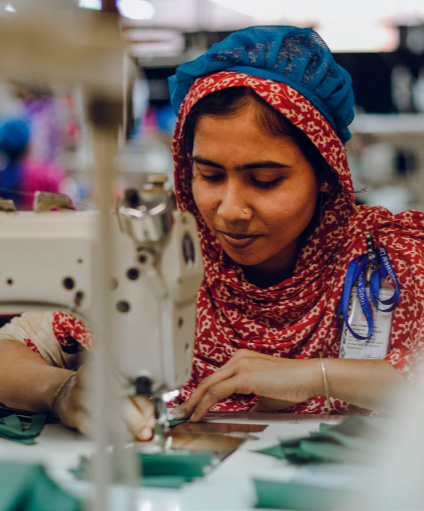One of the pillars of our brand is ‘care’. We care about our products, we care about how you experience them, and we care about the people who help us create them. And so, we take a lot of care to ensure fairness and safety throughout our supply chain. Most of our production is outsourced, meaning we do not own the factories. It is therefore important that we select our production partners carefully and make sure we nurture long-lasting, healthy partnerships. To help us in our efforts to maintain high standards in workers’ wellbeing in the factories we use, we have teamed up with the Fair Wear Foundation (FWF).
What is the “Fair Wear Foundation”?
The Fair Wear Foundation (FWF) is a non-profit organization that collaborates with brands, factories, trade unions, NGOs, and sometimes governments to improve working conditions in textile supply chains worldwide. The FWF focuses on the cutting and sewing processes in making textile goods, as they believe this is where the greatest scope for positive change is. At present, the FWF concentrates its efforts on 11 apparel producing countries through Asia, Europe, and Africa (Bangladesh, Bulgaria, China, India, Indonesia, Macedonia, Myanmar, Romania, Tunisia, Turkey, and Vietnam). Dedicated to transparency and improving working conditions in our supply chain, LaMunt has been a member of the FWF since day one.
Our code of conduct key points:
1. We do not tolerate child labour, ever
2. All employees must be treated with respect and dignity
3. People must be employed based on their ability and never discriminated against
4. Business should be free of corruption
5. Employment relationships must be formally established in a legally binding contract
6. Environmental protection through the mindful use of resources and waste management systems
7. Reasonable hours of work, with voluntary overtime and adequately remunerated
8. Working conditions must be healthy and safe
9. No forced labour
10. Wages must support decent living standards
11. Workers have the right to join unions
How we monitor working conditions:
First screening
All potential suppliers need to go through a human rights screening process, fulfil our basic criteria and commit to our Code of Conduct.
Audits
All suppliers must agree to third-party audits at least every three years. These are conducted in the local language by teams of experts to carry out a comprehensive and in-depth evaluation: with worker interviews, health and safety inspections and thorough document inspections (payroll, safety certifications, time records). Afterwards, findings are shared with the factory and a report on the findings is shared with us.
Worker interviews
We want to make sure that workers have a chance to tell us how they are doing. So as a part of these audits, a team of independent local experts interviews workers about factory conditions. These interviews are conducted off-site to avoid biased feedback or possible retaliation against interviewees. Workers are aware that their comments are anonymously recorded so that they can speak freely.
Corrective action plans
We turn the results from these audits into an action plan: a to-do list of specific findings of things that need to be improved, with concrete targets and a clear timeline. Problems like a missing emergency exit sign over the entrance must be corrected immediately but solving issues of excessive worker overtime related to production planning can be a longer-term goal. Together with our suppliers, we work out how we can solve these problems and offer them support throughout.
Complaints mechanism
The FWF’s Worker Information Sheet, listing workers’ international rights, is posted in our factories, with details of an anonymous hotline and email address they can use to report issues. This is administered by the FWF, who forward complaints to us, so that we can raise them directly with the factory. The complaints and how they are resolved is published on the FWF website.
Regular factory visits
Our quality controllers regularly visit production sites. They are experts on our social compliance requirements and our eyes on the ground, monitoring working conditions in person.
Follow-up
We continue to check in with each factory until an action plan is completed and problems have been solved.
Transparency
Each year, we publish a detailed report on what we have done to improve working conditions. Here’s our latest social report. (link)
New audits
Every three years, we conduct a new audit at our factories. This builds on our previous findings and confirms any progress that has been made.
Collaboration
We cooperate with other brands who use the same factories and share the same values as us in protecting workers’ rights. Sharing the workload means we can focus more effectively on solving problems. It also reduces audit fatigue (an excess of audits) and increases the potential for affecting change.
Evaluation
We evaluate each supplier by using an internal tool. Their ratings and progress are based on audit results and the follow-up of corrective action plans. Thanks to this tool we can understand the most recurrent findings and develop consistent methods to address them. It also helps us to see if our strategy is actually improving working conditions in the factories.
Have a look behind the scenes with our Social Compliance specialist Martine Riblan, click here to see the video.

